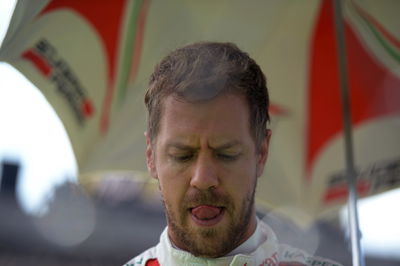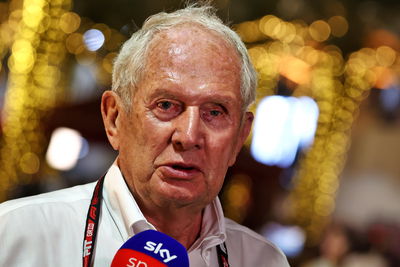Why Vettel's F-bombs are damaging more than F1

By Ollie BarstowFollow @OllieBarstow on Twitter
There was a moment in the Mexican Grand Prix where the camera panned towards 22-time Grand Slam tennis champion Serena Williams, a guest of Mercedes a week after her sister Venus was busy blanking Martin Brundle in Austin.
Seemingly more interested in her phone, while Venus may have just been reminding her to turn down any offer to join their team photo after the race, screenshots of her glazed expression soon lit up social media.
It's ironic then that, of all the sporting superstars in the world, she was potentially the most appropriate person to be spectating paddock side in Mexico that day.
If only broadcasters had the forethought to pan the camera back to her as the race was ending to chronicle her reaction to Sebastian Vettel hurling a volley of abuse towards Max Verstappen, Charlie Whiting and life generally in a startling four-word diatribe of expletives...
After all, Serena can relate. Much like Seb, she is a magnificent and enduring champion, one of the best in a generation... but someone whose temper in moments of madness has clouded her reputation years down the line.
During the 2011 US Open, after an umpire granted a point to her opponent because she distractingly shouted whilst the ball was still in play, Williams launched into a tirade during which she scatter-gunned insults at someone who could have been justified in disqualifying her altogether. She lost her head, along with the match.
Of course, sport is highly pressurised and adrenaline runs deep in the heat of battle. Football players (and Jose Mourinho) rage at referees, cricket umpires bear the brunt of partisan argument and rugby players don't always go to the sin bin quietly.
A part of the 'spectacle' it may be but the 'line' has long been defined and those that cross it will often know they will face consequences.
Unchartered territory
However, Sebastian Vettel's actions - or words - take F1 into unchartered territory.
Criticism is nothing new in F1 but outward abusive language at the sport's 'referee' won't be brushed off as part of its 'sporting narrative'. Yet Vettel doesn't seem concerned about the legacy it could leave on his legacy.
Whether Vettel comes to regret his extraordinary outburst towards Charlie Whiting will become clearer in the coming days when tensions have reduced to a simmer and the FIA considers its actions. Vettel has already apologised to Whiting for the words but was evasive when pressed on whether he felt vindicated in doing so regardless.
He has a point in that sense. I am a firm believer in sportspeople being allowed to say their piece and I worry at the increasing clampdown of sportspeople who dare to critique the powers through non-aggressive means. However, there is eloquent criticism and then there is a barrage of expletives...
With this in mind, Vettel's 'heat of the moment' argument isn't terribly convincing since it has become an amusing-turned-wearisome trend of his in recent months.
Indeed, the message to Whiting was the spectacular crescendo of a tune that has gathered volume over the year to the point that 'Radio Vettel' had established itself as a F1 meme.
Even rival teams have been getting in on the joke with witty Twitter posts in recent races each time he pipes up, while social media was already poking fun at Vettel in Mexico as he raged at Felipe Massa for blocking his attempt at passing... or as most term it 'racing'.
However, while most of us have laughed at the increasing absurdity of his growing frustration, his vitriol towards Verstappen and particularly hostile 'F bomb' towards Whiting - which he followed up by saying he was going to 'hit someone' - were more startling than funny. In that moment, it seemed like a long-running joke that had gone too far.
Though it is something we have had for some time in F1, radio transmissions have generated more than their fair share of headlines this year. Fernando Alonso and Max Verstappen have both expressed frustration at the selectiveness of the messages that are broadcast over the world feed, arguing they are damning because they are out of context from omitted (aka boring) other messages.
There is some pre-meditation to the messages though. As Daniel Ricciardo pointed out, these words don't just get picked up as frustrated mumbles, they have to push the radio button in order to express their feelings. Many drivers have likely sworn at rivals but done so in the privacy of their own helmet.
Prior to the race, Vettel was broadcast calling Fernando Alonso an 'idiot' for getting in his way during free practice, prompting the Spaniard retort with a barbed response in which he said he 'forgave him' because he is under pressure at Ferrari. It a view shared by Christian Horner and Daniel Ricciardo, who added Vettel never seemed this animated during his time at Red Bull.
The Ferrari factor
So why the change? As Alonso alludes to, Ferrari appears the likeliest reason... and he should know better than most.
Out of the car Vettel is calm, polite and gentlemanly. In the car he has skill behind the wheel few can match. His four world titles deserve to be remembered more for their sheer brilliance than the oft dismissive suggestion he was in an unbeatable Red Bull, as demonstrated more clearly in 2015 as he marked his Ferrari debut with some fabulous performances.
Indeed, Vettel appeared to relish the role of the underdog in 2015 and his witty commentary of Lewis Hamilton and Nico Rosberg's occasionally stroppy rivalry won over many fans previously turned off by his erstwhile dominance.
However, in 2016 - as in 2014 - the heightened expectations coupled to tools that aren't quite up to the task have made him somewhat anonymous, while Daniel Ricciardo and Max Verstappen have replaced him as F1's favoured dogged underdogs.
Furthermore, with Maurizio Arrivabene seemingly unenthused by his star driver, Sergio Marchionne throwing down demands and Kimi Raikkonen rivalling his #1 status even as Vettel refuses to acknowledge him as a rival, the 29 year-old is facing his own internal issues even before he steps in the car.
The pressure is there and the emotions are seemingly being expressed in the cockpit. Yet with a microphone in his hand and a camera in his face he remains composed and considered when talking about himself and his team.
It's a taciturn attitude that is in stark contrast to his regular critiquing of others, whether he's arguing against drivers ignoring blue flags, questioning driving standards or dismissing the way the sport is run.
Additionally, following crashes in China and Malaysia, Vettel's tendency to offer a belated soft apology-excuse rather than admit fault outright - before insisting it is time to move on and not dwell on the past - has irked many around him.
Whiting, however, is a new calibre of 'rival' to tackle so publically and aggressively, one who doesn't need to use media sessions or press releases to respond.
While Vettel's anger with Verstappen, Alonso or Lewis Hamilton et al. often leads to a back-and-forth, Whiting has no need to be so public. Instead, those expletives are currently just hanging there and festering as Whiting considers his actions... much like a mother who doesn't get angry but makes it very clear she is 'very disappointed'.
Whiting and the FIA haven't responded and there is no guarantee they will at all. The consensus is that Vettel will receive off-track discipline - potentially out of the public domain - in line with most sports, but his frustrations threaten to leave an indelible mark on both the sport and his reputation.
Vettel will always be a great champion, much like Serena... but she has since expressed regret at her words and the everlasting footnote that will blemish an otherwise distinguished career.
Whilst this is undoubtedly an ungracious episode for Vettel, if he chooses to dig his heels in even in the face of the FIA - much like he has with many of his rivals -, it could take some very impressive (and quiet) performances on track to remind F1 of his quality as a driver.










